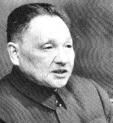
Entre 1976 e 1978, quando Deng Xiaoping travava a luta interna contra os pós-Maoístas, a linha ortodoxa tinha como princípio fundamental o "whateverism". Quando Hua Guofeng sucedeu a Mao Zedong tornou-se conhecido por ter como pedra basilar os "Two Whatevers" (Liǎng gè fán shì): "We will resolutely uphold whatever policy decisions Chairman Mao made, and unswervingly follow whatever instructions Chairman Mao gave".
Ora, este princípio impedia o programa reformador de Deng Xiaoping que uma década antes tinha sido proscrito como revisionista e direitista durante a insanidade da Revolução Cultural. Foi contra esse whateverismo que Deng lutou e com sucesso. Paradoxalmente - ou talvez nem por isso - volvidos 30 anos, é o Whateverism Denguista que serve não só de bússola mas de guia para a acção na China. É nesse sentido que vão as palavras de Frank Ching, num artigo interessante publicado esta semana (24 de Junho) no South China Morning Post:
"China's leaders today should do what they think is best for the country and not be afraid of doing anything contrary to what Deng may once have said. Unless they have the courage to do this, they will return the country to the position it was in when Hua Guofeng succeeded Mao as party chairman. At that time, there were people, later labelled supporters of "whateverism", whose position was that whatever instructions Mao issued during his lifetime should be carried out and whatever Mao opposed should never be done.
Deng criticised the proponents of "whateverism". After all, China cannot be ruled by a dead man. That is as true today as it was then. Mao was evaluated by the party after his death and it was concluded that his contributions were greater than his errors, grievous though they were.
China and the party have changed. It may not be necessary to make a formal political assessment of Deng. But he would be the first to admit that he was not perfect, that he had made mistakes. The party does not need to act as though everything Deng said or did cannot be questioned. It is time to end this taboo".

No comments:
Post a Comment